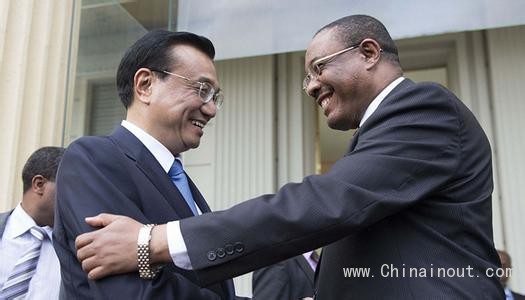
一些经济学家认为,非洲大陆在基础设施领域存在巨大投资需求,是非洲经济腾飞的一个重要条件。法国前外长韦德里纳和另一位经济学家利昂内尔·津苏为法国经济部起草的一份报告显示,未来几年间,非洲地区在这个领域的投资需求将达到1180亿美元。非洲开发银行行长唐纳德·卡贝鲁卡认为,基础设施建设已成为非洲发展的标志。在过去10年,非洲开发银行出资280亿美元用于非洲的基础设施建设。
其次,非洲大陆贸易自由化进程正在向前推进,未来有望大大提升非洲国家间贸易水平。今年6月10日,整合东南非共同市场、南部非洲发展共同体和东非共同体的三方自由贸易协议成功签署,该自贸区覆盖26个国家,涉及6.25亿人口,相关国家国内生产总值总额达到1.2万亿美元,占整个非洲生产总值的58%。5天后,非洲联盟成员国启动了非洲大陆自由贸易协议谈判,旨在于2017年建立一个覆盖全部非洲人口、经济总量达到2万亿美元的超级自贸区。
此外,人口红利将逐渐释放,也是看好非洲经济远景的重要因素。非洲开发银行公布的数字显示,非洲的人口到2050年将增加一倍,总数将达20亿,届时那些拥有一定支付能力的中产阶级人口将超过14亿。
当然,让美好的憧憬变成现实,非洲还要经受巨大考验。毕竟,目前约6 亿非洲人(相当于非洲总人口的2/3)仍用不上电;60%的城镇居民生活在贫民窟当中;36%的人喝不上合格的自来水。虽然拥有丰富的土地和水资源,但非洲粮食产量偏低,2013年非洲83%的粮食依靠进口,面临严重的粮食危机。
正如法国《论坛报》网站曾刊登阿尔弗雷德·米尼奥的一篇文章讲述的那样,今天的非洲就好像是一只装了一半水的瓶子:在“非洲悲观主义者”看来,还是一个空瓶子;在“非洲乐观主义者”眼里,却是一个充满了各种实际机遇的瓶子。从目前来看,全球主要国家的政策制定者都加入了“非洲乐观主义者”阵营,他们积极参与非洲经济事务,将有助于非洲经济早日实现腾飞。(中国进出口网)

In recent years, the growth rate of Africa's GDP has remained at about 5%, which is next only to Asia’s and far higher than Europe’s. The World Bank estimates Africa's GDP by 2050 is expected to increase 15-fold. According to the UN's "2015 World Economic Situation and Prospects," Africa's economic growth is expected to reach 4.6% this year and 4.9% next year. French Havas group’s surveys show that all foreign investors in Africa are optimistic for short-term and medium-term economic growth prospects in Africa.
Some economists believe that on the African continent there is a huge demand for investment in infrastructure, it is an important condition for economic take-off in Africa. Former French Foreign Minister Hubert Vedrine and another economist, Lionel Zinsou drafted a report for the French Ministry of Economy, showing that in the next few years, the investment Africa needs in this area will reach $118 billion. African Development Bank President Donald Kaberuka believes that infrastructure construction has become a symbol of Africa's development. In the past 10 years, the African Development Bank invested $28 billion for infrastructure development in Africa.
Secondly, the African continent trade liberalization process is moving forward, in the future the level of trade between African countries is excepted to be greatly enhanced. On June 10 this year, the COMESA, the Southern African Development Community and the the East African Community successfully signed a free trade agreement, the FTA covers 26 countries, 625 million people, some countries’ total GDP reached 1.2 trillion US dollars, accounting for 58% of Africa's gross domestic product. 5 days later, the African unio member States launched the African continent free trade agreement negotiations, aimed at establishing a super FTA covering all of Africa's population, economic output reaching $2 trillion in 2017.
In addition, the demographic dividend will gradually release, which is also an important factor in Africa's promising economic outlook. African Development Bank released figures showing that Africa's population will double by 2050, the total number will reach two billion, then those middle-class who have a certain payment ability will reach more than 1.4 billion.
Of course, to make a better vision into reality, Africa also needs to withstand the extreme tests. After all, about 600 million Africans (equivalent to two-thirds of Africa's total population) still have no access to electricity; 60% among urban residents live in slums; 36 per cent of people have no access to tap water qualified. Although rich in land and water, but Africa has low food production , in 2013 83% of African food are met by imports, Africa is facing a severe food crisis.
As described in an article written by Alfred Minho then published at the French "Tribune" website, today Africa is like a half full bottle of water: In the "Afro-pessimists" eyes, it seems an empty bottle; in the "Africa optimists' eyes, it is a bottle full of real opportunities. From now, policy-makers of the world's major countries have joined the "African optimists' camp, they actively participate in African economic affairs, which will contribute to the early realization of Africa's economic take-off.











